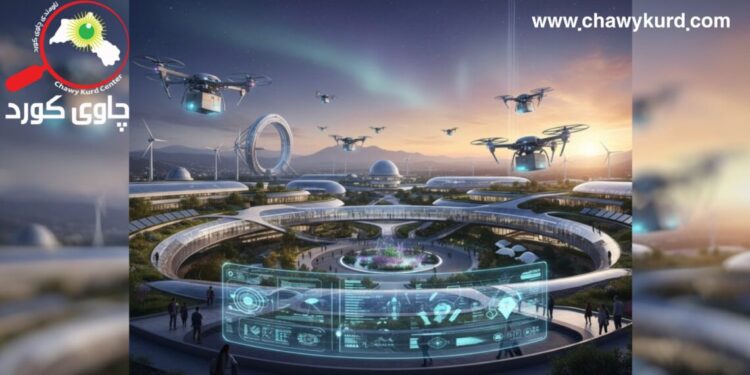A Modern and Innovation-Centric Institution
For a long time, the university has been a center for producing, preserving, and transmitting knowledge. It has always played a fundamental role in educating leaders, disseminating information, and shaping culture. However, the 21st century has presented universities with entirely new conditions: globalization, the rapid acceleration of knowledge production, and the emergence of transformative technologies. These changes raise fundamental questions: What will universities be like in 2050? Will they remain the classical institutions of today, or will they become global organizations based on entrepreneurship and innovation? This article explores the main trends and challenges, arguing that the university of the future, if it wants to maintain its position, must increasingly rely on managing the flow of knowledge, fostering innovation, and responding to the needs of society.
The University in Transition
Universities have never been separate from society. Politics, economy, and culture have always influenced their functions. But in recent decades, these pressures have intensified. Universities are no longer simply expected to offer education; they are becoming drivers of innovation, partners in solving social problems, and guardians of democratic values. Important documents like the Bologna Process and the Magna Charta Universitatum have emphasized the need for universities to be internationalized, accountable, and responsive. At the same time, governments and citizens have questioned universities: Are they changing fast enough? Can they prepare the next generation for a world full of uncertainty? These questions reveal that universities are forced to rethink their mission.
Global Trends and Future Scenarios
Two global trends fundamentally shape the future of universities:
- Scaling Up Societies: No society can live in isolation anymore. Economies, politics, and cultures are intertwined, and universities must both participate in global networks and respond to local needs.
- Accelerating Knowledge Production: Human knowledge approximately doubles every five years. This requires continuous learning, interdisciplinary research, and greater flexibility in higher education systems.
Within these trends, several scenarios can emerge:
- Global Integration and Continuous Growth: An optimistic scenario where democracy spreads, economies flourish, and universities thrive as global centers of innovation.
- Global Crisis: A pessimistic scenario where environmental degradation and inequality undermine the foundations of higher education.
- Regional Renaissance: The strengthening of indigenous cultures and traditions that create different paths to knowledge.
- Knowledge-Centric Society: Most likely a scenario where learning and innovation become the basis of human development, with universities playing a central role.
From Storing and Preserving Information to Managing Knowledge and Information
Traditional universities have focused on storing and transmitting knowledge. But by 2050, their role will expand: managing the flow of information and knowledge.
This means:
- Breaking down boundaries between disciplines and connecting discoveries in physics, biology, humanities, and artificial intelligence.
- Creating an environment that fosters innovation, entrepreneurship, and cultural imagination.
- Supporting continuous learning and accompanying people throughout their lives and careers.
- Assuming ethical responsibility in the face of powerful technologies such as genetic engineering and artificial intelligence.
Thus, the university of the future will not only be a repository of knowledge but also a leader and organizer of the flow of knowledge.
Technology and Transformation in Higher Education
Technology, especially the internet, artificial intelligence, and digital communication, has completely transformed the landscape of universities. Research collaborations that sometimes took days, weeks, or months can now be done in seconds. In the future, “smart learning environments” will emerge that adapt education to individual needs and even conduct some parts of research independently.
Imagine a student in 2050 learning with the guidance of artificial intelligence; a system that corrects their mistakes, suggests appropriate resources, and even proposes new hypotheses. However, these advancements also come with risks: isolation of researchers, over-reliance on machines, and ethical issues related to privacy and human responsibility. Therefore, the university’s task is to use technology to serve human innovation and criticism, not to replace it.
Universities in Emerging Countries
For emerging countries, the future of the university is both an opportunity and a threat. Globalization can provide opportunities for knowledge exchange and collaboration, but if they cannot adapt, they risk serious marginalization.
Universities in these countries need to:
- Invest in higher education and research.
- Align higher education policies with local economic and social needs.
- Create a balance between preserving cultural identity and participating in global science.
The main challenge is not “catching up” but finding a unique place in the global scientific ecosystem.
The University’s Horizon in 2050
Considering these trends, the university of 2050 is likely to have the following characteristics:
- Global yet Local: An international network that is sensitive to local needs.
- A Center of Innovation: Where science, culture, and social innovation converge.
- A Lifelong Companion: The university will no longer be limited to youth but will accompany individuals throughout their lives.
- An Ethical Pole: An institution that takes responsibility for the proper use of new technologies and upholds human values.
By 2050, universities will have their place at the heart of a global, knowledge-centric society. They will neither disappear nor be replaced by companies or digital platforms. Instead, they will become institutions that help society manage complexity and balance tradition with change. Two factors guarantee the survival of universities: first, the continuous and uninterrupted growth of knowledge; second, the constant human desire to question and seek truth. If universities integrate these two into their strategy and mission, they will undoubtedly not only survive but become centers of innovation and entrepreneurship for the next century. I hope that university officials and academic staff will seriously consider university programs and strategies, as well as national and human goals, towards innovation, the creation of higher values, and the scientific advancement of our society.
Note:
- Magna Charta Universitatum: A global document drafted and signed in 1988 at the University of Bologna, which promotes the fundamental principles of universities such as academic freedom, institutional autonomy, and inter-university cooperation [1, 3, 4]. Its aim is to uphold common academic values and foster collaboration among higher education institutions worldwide, encouraging universities to adapt to the needs of contemporary societies and promote critical thinking.
- Bologna Process: A series of agreements between governments to reform European higher education systems to create the European Higher Education Area, initiated in Bologna, Italy, in 1999. Its main objectives are to increase student and staff mobility, enhance transparency and recognition of qualifications, promote inclusive and accessible higher education, and strengthen Europe’s global competitiveness. Key features include a three-cycle degree system (Bachelor’s, Master’s, Doctorate), the European Credit Transfer and Accumulation System (ECTS), and a strong emphasis on quality assurance.
Here’s an image that captures the essence of a futuristic university, integrating technology and a global perspective, as described in your article.
`



























































